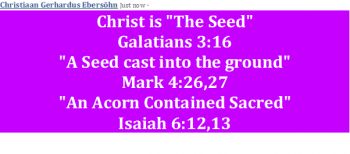GerhardEbersoehn
Well-Known Member
- Jan 14, 2014
- 6,346
- 577
- 113
- Faith
- Christian
- Country
- South Africa
That makes me think, I cannot further delay the final conclusion to the weighing of the one against the other HUMAN 'interpretation' which the TRANSLATORS, of inter alia the KJV, give for the INSPIRED words which Mark and Matthew (God's two Gospel witnesses) give for the DIVINE words spoken by Jesus Son of the Father.
Says Steve Owen above, <<If it was Hebrew, then azabthani [from azab, as I told you] would have been used instead of the Aramaic word "Sabachthani.">> Steve Owen explains what he said before, that <<what the Lord Jesus Christ experienced was the feeling, as a Man, of being forsaken by God.>>
Why? Because <<Enkataleipo means to forsake or abandon>> says Steve Owen. But Steve Owen FORGETS <forsake or abandon> is not what is written or what Mark or Matthew wrote or what Jesus, said-- is not even what Mark or Matthew "interpreted", but is what the translators decided "Sabachthani" - whether Hebrew or Aramaic (it does not matter!) -, must mean.
What could arguing like Steve Owen’s be called that’s not unfair? ‘Arguing in a circle’? ‘Begging the question’? Let’s see.
<<Steve Owen said: ↑in Mark 15:34, the Lord Jesus is speaking Aramaic, not Hebrew. This very point came up on this board just a short while ago.>> (Emphasis GE)
<<the Lord Jesus is speaking Aramaic>>, is Steve Owen’s reason for asserting <<Steve Owen said: ↑Also, enkataleipo is a stronger form of leipo, which does indeed mean, to leave. Enkataleipo means to 'forsake,' or 'abandon.' Which is what happened to the Lord Jesus Christ on the cross between the third and ninth hours.>>
According to Steve Owen the ‘fact’ (or supposition) that <<Enkataleipo means to 'forsake,' or 'abandon'>> is the proof that Jesus spoke Aramaic, and according to Steve Owen the ‘fact’ (or supposition) that Jesus spoke Aramaic, is the proof that <<Enkataleipo means to 'forsake,' or 'abandon'>>.
This is ‘Arguing in a circle’ - ‘Begging the question’!
The cherry on the cake, however ...
No, you are <<not telling you (me, GE) different.>> You, are telling me exactly the same thing, <<Steve Owen said: ↑Also, enkataleipo is a stronger form of leipo, which does indeed mean, to leave. Enkataleipo means to 'forsake,' or 'abandon.' Which is what happened to the Lord Jesus Christ on the cross between the third and ninth hours.>> <<If it was Hebrew, then azabthani [from azab, as I told you] would have been used instead of the Aramaic word "Sabachthani>>.
So what does ‘azab’ mean in Hebrew?
“fail” x 2; “forsake” x 123; “leave” x 67; “leave destitute” x 1; “leave off” x 4; “refuse” x 1; “be forsaken” x 6; “left / be left” x 5.
Steve Owen says ‘sabachtani’ means fail / forsake / leave / leave destitute / leave off / refuse / be forsaken / left / be left. YES OR NO?
Steve Owen says <azabthani> means fail / forsake / leave / leave destitute / leave off / refuse / be forsaken / left / be left. YES OR NO?
Any which one leaves one whosoever NOWHERE, both words mean <forsake> ACCORDING TO INTERPRETERS AND SUPPOSED TO BE TRANSLATORS.
Did Mark and Matthew with ‘enkataleipoh’ attach the meaning of “forsake” to ‘sabachtani’? Refer back to #260
TBC DV ASAP
Says Steve Owen above, <<If it was Hebrew, then azabthani [from azab, as I told you] would have been used instead of the Aramaic word "Sabachthani.">> Steve Owen explains what he said before, that <<what the Lord Jesus Christ experienced was the feeling, as a Man, of being forsaken by God.>>
Why? Because <<Enkataleipo means to forsake or abandon>> says Steve Owen. But Steve Owen FORGETS <forsake or abandon> is not what is written or what Mark or Matthew wrote or what Jesus, said-- is not even what Mark or Matthew "interpreted", but is what the translators decided "Sabachthani" - whether Hebrew or Aramaic (it does not matter!) -, must mean.
What could arguing like Steve Owen’s be called that’s not unfair? ‘Arguing in a circle’? ‘Begging the question’? Let’s see.
<<Steve Owen said: ↑in Mark 15:34, the Lord Jesus is speaking Aramaic, not Hebrew. This very point came up on this board just a short while ago.>> (Emphasis GE)
<<the Lord Jesus is speaking Aramaic>>, is Steve Owen’s reason for asserting <<Steve Owen said: ↑Also, enkataleipo is a stronger form of leipo, which does indeed mean, to leave. Enkataleipo means to 'forsake,' or 'abandon.' Which is what happened to the Lord Jesus Christ on the cross between the third and ninth hours.>>
According to Steve Owen the ‘fact’ (or supposition) that <<Enkataleipo means to 'forsake,' or 'abandon'>> is the proof that Jesus spoke Aramaic, and according to Steve Owen the ‘fact’ (or supposition) that Jesus spoke Aramaic, is the proof that <<Enkataleipo means to 'forsake,' or 'abandon'>>.
This is ‘Arguing in a circle’ - ‘Begging the question’!
The cherry on the cake, however ...
I am not telling you different. …. "Eli Eli [or 'Eloi, Eloi']lama sabachthani?" is a Greek transliteration of Aramaic words. If it was Hebrew, then azabthani [from azab, as I told you] would have been used instead of the Aramaic word "Sabachthani." that is what I was trying to tell you in my last post.
No, you are <<not telling you (me, GE) different.>> You, are telling me exactly the same thing, <<Steve Owen said: ↑Also, enkataleipo is a stronger form of leipo, which does indeed mean, to leave. Enkataleipo means to 'forsake,' or 'abandon.' Which is what happened to the Lord Jesus Christ on the cross between the third and ninth hours.>> <<If it was Hebrew, then azabthani [from azab, as I told you] would have been used instead of the Aramaic word "Sabachthani>>.
So what does ‘azab’ mean in Hebrew?
“fail” x 2; “forsake” x 123; “leave” x 67; “leave destitute” x 1; “leave off” x 4; “refuse” x 1; “be forsaken” x 6; “left / be left” x 5.
Steve Owen says ‘sabachtani’ means fail / forsake / leave / leave destitute / leave off / refuse / be forsaken / left / be left. YES OR NO?
Steve Owen says <azabthani> means fail / forsake / leave / leave destitute / leave off / refuse / be forsaken / left / be left. YES OR NO?
Any which one leaves one whosoever NOWHERE, both words mean <forsake> ACCORDING TO INTERPRETERS AND SUPPOSED TO BE TRANSLATORS.
Did Mark and Matthew with ‘enkataleipoh’ attach the meaning of “forsake” to ‘sabachtani’? Refer back to #260
TBC DV ASAP



